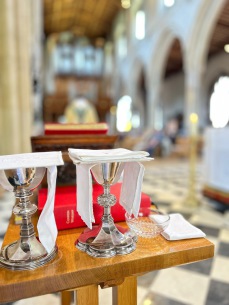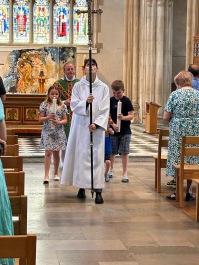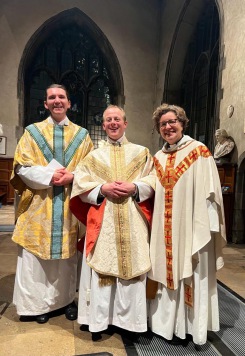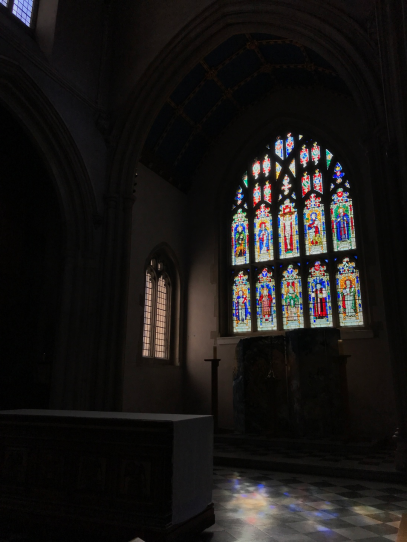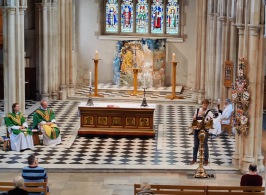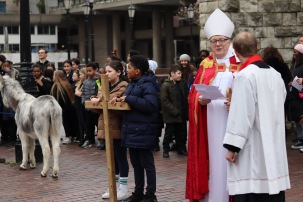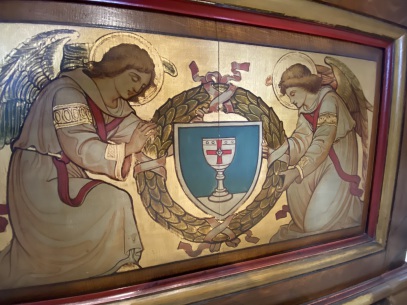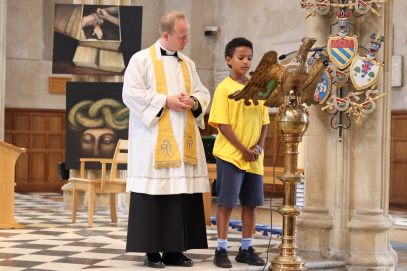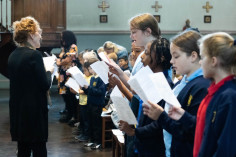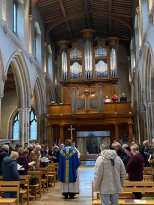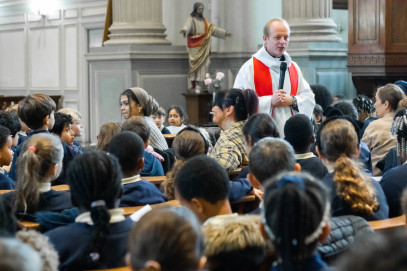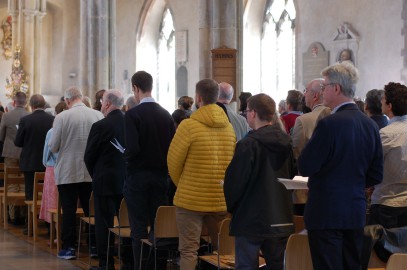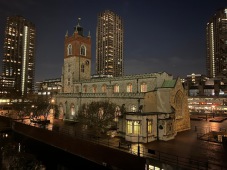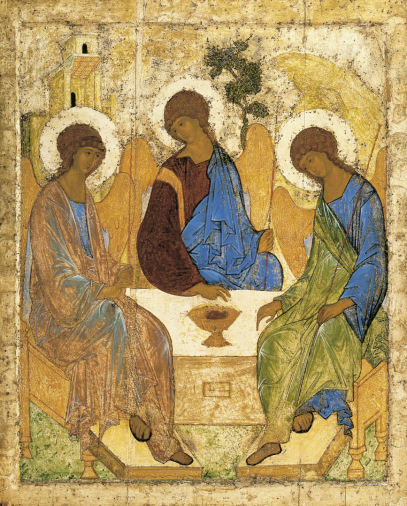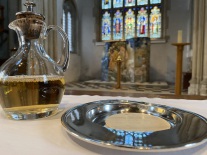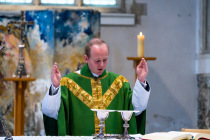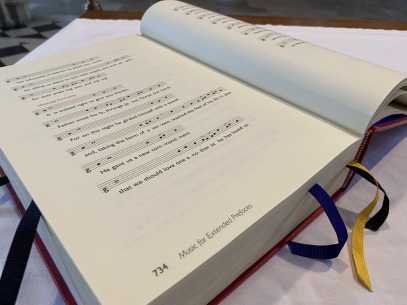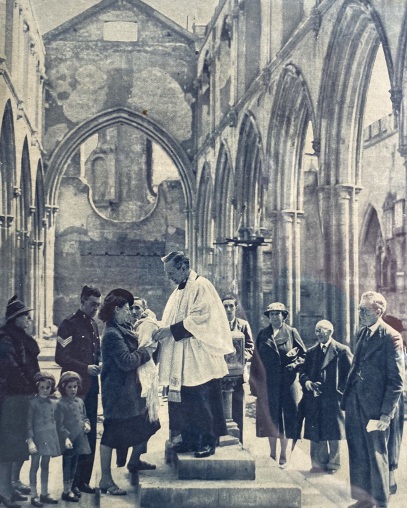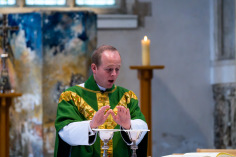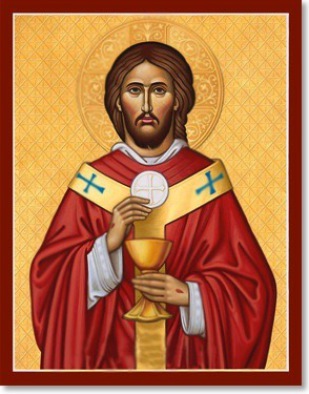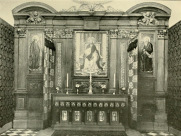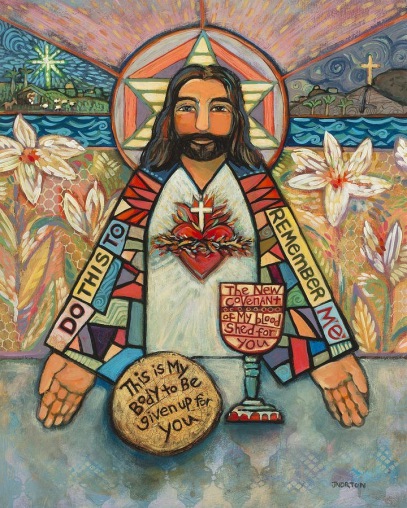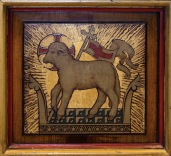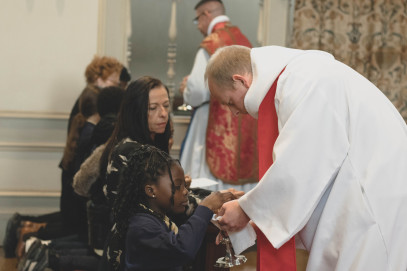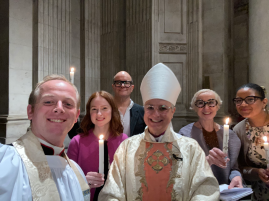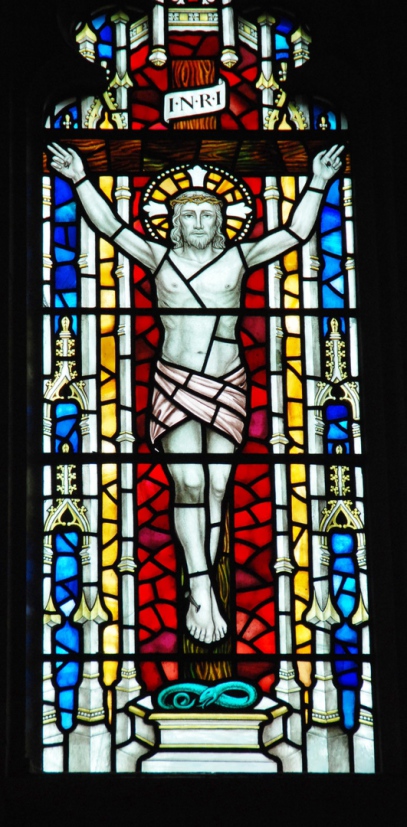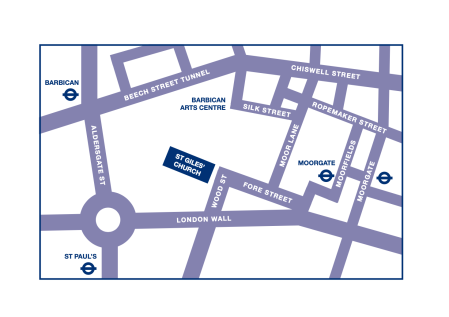A Guide to our Worship
The Holy Eucharist
What?
Why?
When?
How?
Here are some ‘whys and wherefores’ about our worship in a booklet at the back of St Giles’ Church and on our website.
It is worth asking the question - why do we do what we do in church? And why do we do it in the way we do it?
Nothing is by accident, well, not much.
Our liturgy (the worship of the people of God together in church) is the most important thing we do together. It has been handed on to us by those who have gone before us. We celebrate the Holy Eucharist together in our generation, and we hand this gift on. As a local church community, the Eucharist is the source and summit of our life together, until we get to heaven.
Let’s explore this amazing gift together.
If you’re not familiar with all this, ‘come and see’ (as Jesus says to people in the Gospels). If you’re already at home in the Eucharist, what new depths might you explore? If you’d like to contact one of the clergy and ask more about all this in person, please do via our website.
The liturgy of the Eucharist is always ancient and fresh, always the same, and always new. These pages contain the outward signs of God at work in the world. It is first and foremost a life-embracing, life-changing adventure that all people (no matter who you are) are invited to embrace.
Just the Bible, bread and wine and a few folks on a Sunday morning? Look closer…
The Procession
We assemble each Sunday. It is what Christians do - it is in our DNA to assemble on the Resurrection Day.
Church, from the Greek ‘Ecclesia’, means ‘assembly’.
God draws us together.
And then from amongst our midst - the entrance of the ministers in procession (even just a procession of one, sometimes!) This isn’t just about pomp. It has a theological value too.
Processions in Church remind us that we are ‘a people on the move’. We are sojourners, pilgrims through this life, on our way home to heaven.
The stories of the Exodus and the Promised Land aren’t limited to the Old Testament. Quite the reverse, they are there because they are to be echoed from the pages of the Old Testament into all human life.The Procession at the beginning and end of each Eucharist or other service signifies this, and reminds us of our true nature.
Vesture
Very early on in the ‘Jesus movement’ Christians began to ‘dress up’ for worship. The poshest things they could think of were the Roman senatorial robes. So they inspired the priestly eucharistic vestments still used today. Each has a significance, and is accompanied by a special prayer when put on.
The alb (meaning white) echoes Revelation (7.14) speaking of our Baptismal identity - those robed in white, washed in Christ’s blood.
The stole is a symbol of priestly authority. The girdle is chastity and temperance. The amice is a spiritual helmet. The chasuble is God’s all-encompassing love.
Incidentally, the great and good of Rome would often be preceded in the streets by acolytes with torches and a censer burning sweet-smelling incense to purify the way through the smelly streets. Of course on our altar is the vision of the angels swinging censers before God, from both the Old Testament (Exodus 30), and Revelation (chapter 8) in the New Testament. This is an honour Christians came to give the Gospel book and processions in church. They wanted to give God their best after all. That’s why our vestments are beautiful too, and our church building for that matter; purposely so. We give God our best.
Vestments are not about priests dressing up! They help the priest’s individuality take a back seat as s/he simply performs their role in the assembly. It’s about Jesus’ priesthood, not any ordained clergyperson taking centre stage. For as long as the priest is celebrating the Eucharist s/he is ‘in persona Christi’ (in the person of Christ) - it isn’t about them, it’s about Jesus, in whose place they stand to administer the Sacraments to His people. That’s why we stand as clergy process in and out, and some people bow as the celebrant passes, not because of the person walking in, but because one of the ways Jesus chooses to minister to us is through priests.
Reverencing the altar
This place is the heart of the church building. Every altar is a place of miracles. As we enter church, and as the procession does, we bow to the altar.
Most churches are a progression from font (by the door) to altar (at the east end). The architecture takes us on a theological journey, a mini pilgrimage from birth to death and beyond death to heaven (see St Giles’ East Window full of Saints - the Company of Heaven!).
We bow to the altar, and genuflect (bend the right knee to the ground) to the Sacrament of Holy Communion itself. It may not be something you’re used to. Don’t worry, give it a try. Clearly it belongs to courtly fashions in times gone by, when we would have bowed to lords and ladies, kings and queens. It may seem unnatural when you start bowing or genuflecting, but soon you’ll find that your body can help you pray even when your mind might wander!
Our bodies, and the physical movements of the ritual can anchor us in prayer, and stir us to worship in a deeper way than our minds on their own.
Begin in God’s Name and the Sign of the Cross
A good example of praying with your body comes next: the Sign of the Cross. Traditionally Christians make the sign when we invoke the name of the Trinity. In the West we go up, down, left, right. In the Orthodox East they go up, down, right, left.
Making this physical prayer, this gesture, your body is saying: ‘Yes, I take the cross of Christ and make it my own. Yes, amen, My body is a part of His Body’. We take His death and resurrection, the mystery into which we were baptized and say ‘yes, I am part of this story’.
Perhaps you’ve never done that before. Give it a go, let your body pray as well as your conscious mind.
And as we make that sign we say that everything we do from here on in is done in the name of the Trinity. Names are powerful. In ancient times, and in theological terms, names are not just labels or a means of talking about something or someone. The name is itself the presence and essence of the person or thing.
That’s why Jews traditionally don’t speak the Name of God, because it is so powerful and holy. Jesus’ name is given him by an angel (Lk 1.31), so is St John the Baptist’s (Lk 1.13). The name of God is written on the foreheads of the redeemed in Revelation (Rev. 14.1).
Names are powerful, we begin our worship, and the week ahead in God’s Holy Name. We pray through the Name of Jesus (Jn 14.13-14). God’s name is God’s power (Psalm 83.18).
Try it now. Make the Sign of the Cross and pray:
In the Name of the Father and of the Son and of the Holy Spirit. Amen.
So we begin to worship
Worship is our primary calling, and all life flows out of it. Birds sing, fly, eat, reproduce. We do all that too. But as human beings, worship is our highest calling, our truest and most honest use of time. After all it is what we will do forever in heaven. Just as Charles Wesley (whose grandfather was vicar here, and his brother curate of our St Luke’s Old Street) says in his hymn Love Divine: ‘till we cast our crowns before Thee, lost in wonder, love and praise'.
Some people are fond of saying ‘you don’t have to go to Church to be a Christian’. But being a Christian isn’t just a matter of what you believe - that Jesus is God. Or being nice or giving to charity. Plenty of atheists or people of other faiths can do that too! Christ came that we might be drawn into relationship with God, and that is built on worship. Can you be a Christian without coming to Church? … ‘Why try?’ Is my answer!
Time in worship is not productive. It can’t be measured or submitted to a Management Consultancy process of analysis and improvement. It is the beginnings (faltering with the limitations of our earthly life) of an ecstatic union that will last forever and fulfil all the longings of our nature.
Medieval writers and saints often used sexual imagery for prayer and worship, being the closest we have with the blunt instruments of language to say what we are doing here. That’s why art and music are so key to our faith; they reach beyond what we can say, feel or know, to plumb the depths of being and alive-ness, that words cannot touch. When we worship we fulfil our place in the universe. We swim with the tide of life, like birds when they sing and fly.
Confession
What a gloomy start to the service!?
Of course, it’s nothing of the sort.
Instead, think of the Confession as a welcome and liberating fresh start.
Fr Jack writes: ‘I used to think this need to confess at the start of most acts of worship could be a little overdone, but as I have grown into adulthood, and aware of my shortcomings both inherent and systematic, and also the stupid stuff I think, say and do day by day - I am more and more grateful for this space to articulate and let go of those barnacles of life week by week’.
Each week we gather up the life of the week behind us, and have a fresh start as we begin again. A one-on-one Sacramental Confession with the help of a priest is also a very helpful tool for life. It’s not just for Roman Catholics and Orthodox. Whilst less common in the Church of England, it is still there to help everyone. Speak to one of the clergy if you’re interested.
In the monastery, the monks or nuns end each day with Compline: Night Prayer. It begins with a confession. They wipe clean all the emotional, spiritual, relational mud they have acquired in the course of the day, and ready themselves for a good night’s sleep, and, when it comes, a good death.
Confession is a gift.
Readings and psalm
Why do Christians read the Bible in worship? Well, predominantly so that we can understand our story.
We read the Bible not just to hear the story of people long ago, but to understand our story: how we fit into the story of God, the story of His people, the story of His revelation in Christ, the story of our salvation.
As Martin Luther said of the Bible:
‘de te loquitur’, ‘it’s talking about you’.
In the Old Testament, we learn our own history, are taught about our own creation, hear God addressing us, just as much as He addresses the prophets.
In the New Testament, we journey with St Paul and the other apostles into a deeper understanding of Christ our friend, learn how to be His Body, and hear our own future foretold, as saints in His coming Kingdom.
And in the Gospel, Christ comes to each and every one of us once more, and says, ‘Follow me.’
We read the Bible together, not just with the people in the pews next to us, but the people of God down the generations, and the people of God who appear in its pages. It is a gift from God.
Hymnody
We’ve already spoken about singing a bit.
Hymnody, our hymn-singing, is also essential.
We do it for various reasons—hymns teach us, help commit things to heart and to memory in a way that spoken words alone can’t, hymns build our community and fellowship as together we sing unto the Lord—but perhaps the most obvious and important reason we sing hymns is, simply, worship.
As we’ve said, our primary call as human beings is to worship our Creator; and how natural it is for heartfelt worship to bubble up into song. And that doesn’t simply mean joy all the time, it can mean lament and confession, as well as thanksgiving, praise and wonder. Hymn-singing touches something deep within us in a way that words alone barely can.
Hymnody
We’ve already spoken about singing a bit.
Hymnody, our hymn-singing, is also essential.
We do it for various reasons—hymns teach us, help commit things to heart and to memory in a way that spoken words alone can’t, hymns build our community and fellowship as together we sing unto the Lord—but perhaps the most obvious and important reason we sing hymns is, simply, worship.
As we’ve said, our primary call as human beings is to worship our Creator; and how natural it is for heartfelt worship to bubble up into song. And that doesn’t simply mean joy all the time, it can mean lament and confession, as well as thanksgiving, praise and wonder. Hymn-singing touches something deep within us in a way that words alone barely can.
The Gospel
Next let’s look at the Gospel and its procession.
The Gospel procession dramatises the Incarnation, the coming into our midst of the Word made flesh - Jesus of Nazareth. The Word of God comes from the heavenly altar and journeys into his people, accompanied by, of course, the Cross. We turn with our hearts and our bodies towards Christ in our midst, and hear him speaking to us once more. This is the summit of our Liturgy of the Word: here Christ is revealed in word, before he is revealed in flesh and blood at the altar.
And here we practise, too, discerning Christ among us. We practise using our bodies, our eyes and ears to discern Christ in our midst—in the people around us, in our friends and neighbours, in the homeless woman outside—and we practise turning our hearts to them.
Sermon
Next we hear the sermon. The sermon is simply an aid. We have listened to the word, and now we listen to its interpretation, or rather an interpretation from people we (hopefully) trust. The preacher doesn’t tell us what to think, as much as she or he encourages us to think:
to connect what we have heard to our lives and our world;
to consider what this means for our faith;
to provide further context, information or interpretations to help us understand what particularly impenetrable or disparate parts of Scripture might be saying.
But the chief preacher is, of course, Christ.
Christ is the perfect revelation of God and God’s will, Christ is the Word of God. And if we ever need to understand what God is saying to us in Scripture, we look to Christ, to whom, hopefully, every preacher points.
Creed
After the sermon, we pause to consider what we have heard means for us and for our faith. And then we stand and affirm that faith, taking ownership of it in the creed.
The creeds arose out of the early Councils of the Church as a way of setting down precisely what we believe (and weed out heresies).We use them in worship to keep central the mystery of who God is, and who we are in him.
Each time we read them, we might feel different things: we might say them proudly or tentatively; we might be encouraged or confused; new things might jump out at us.
During the creed we bow at the account of the Incarnation: ‘he came down from heaven… and was made man.’ We reverence this amazing mystery with our bodies.
Intercessions
The intercessions that follow the creed are the prayers of the people. These are not simply a divine shopping list, telling God what we want. Instead here, just like with bowing in the creed, or turning during the Gospel procession, we are putting ourselves in the posture of Christ, who loves and intercedes for our world.
We come to God and hold before Him the brokenness and need of His/our world, and bring that with us to the Eucharist, the saving mystery of Christ, who entered into that brokenness and redeemed it, and who at the altar gives us a glimpse of a world beyond war and suffering and death.
Intercessions
The intercessions that follow the creed are the prayers of the people. These are not simply a divine shopping list, telling God what we want. Instead here, just like with bowing in the creed, or turning during the Gospel procession, we are putting ourselves in the posture of Christ, who loves and intercedes for our world.
We come to God and hold before Him the brokenness and need of His/our world, and bring that with us to the Eucharist, the saving mystery of Christ, who entered into that brokenness and redeemed it, and who at the altar gives us a glimpse of a world beyond war and suffering and death.
The Peace
It is Christ’s Peace.
We acknowledge that the Lord is here.
That He has drawn us together, and that we are one in Him.
So, if we have a grievance with someone, or especial love for someone, or if it’s someone we’ve never met before - all and any of those: we are one in Christ (St Matt 5.23).
And then, we are ready as one, to go to the altar of God (Colossians 3.15).
The Offertory vs Collection
And we don’t go to the altar empty-handed. We approach by means of the Offertory. That is not the collection. At the collection we acknowledge that everything comes from God, the least we can do is give a ‘thank you’ back. The Church of England recommends tithing 10% - perhaps 5% to the parish church and 5% to other charities (Leviticus 27.30: “tithe” or “עשר” or “ten” ). I’m sure we each have our own pattern.
Fr Jack writes: ‘I purposefully don’t know who gives what to St Giles’, but nonetheless I want to thank you for your generosity. We need it, and we rejoice in it. Personally, I give a little over 10% each month of what pings into my bank account and I find that really freeing and good. I recommend it!’
Under the offertory hymn (as the collection is taken) bread and wine are presented as an offering. That’s why they are brought up from the people. We offer them for sacrifice (it’s a lot tidier than a sheep or goat, thankfully). We offer bread and wine to God, and God gives them back to us a few moments later, when they have become the Lamb who was slain: Christ.
It’s a very powerful moment of gift, transformation and return. Given from earth - they touch heaven - and then we are invited into the fringes of heaven to receive them here, before returning, spiritually recharged, to earth. (1 Corinthians 10:16-21 and Hebrews 10.10)
Sursum Corda
As this transformation takes place we sing loads. The Old Testament is full of singing - Hannah’s song (1 Sam 2) that will be taken up by Mary’s Magnifcat centuries later (St Luke 1). David’s Psalms. The chants of the Temple. In the New Testament Jesus and the others sing psalms and hymns at the Last Supper (St Mat 26.30).
Human beings were made to worship; and song and worship go hand in hand. You may not be a strong singer, but your singing delights God and does you good no matter what. Singing together is one of the most beneficial things we can do, psychologically, emotionally, spiritually. This is no accident, after all, we’re made to worship. St Augustine is said to have declared, ‘the one who sings, prays twice’. Singing our prayers carries them deeper inside us, and it throws them up, joining our voices with the song of heaven (Rev 5.8).
And so we sing: ‘hearts up!’
In English we say ‘li-i-i-ift up you-r-r hear-r-ts’. But the original Latin ‘sursum corda’ is more direct. Is it an instruction or a statement of fact? “Sursum corda’: ’Hearts up!’
And what a wonderful thing to have: hearts that aren’t low, or locked away for fear that they might get trampled on. But hearts that are lifted up. What a way to live! And that is what we are aspiring to now.
And we give thanks, as ‘it is meet and right so to do’. ‘Eucharist’ means ‘thanksgiving’.
We are people who decide day by day and Sunday by Sunday to define our lives, to spend our time, giving thanks. A people defined by gratitude and open hearts - that is who Chrisitians are. And it’s true of us today, with so much to give thanks for, as it is for many persecuted Christians gathering to celebrate the Eucharist in fear, as it is for Christians who time and again in our family story have offered the Eucharist with the last piece of bread they have. A people defined by gratitude and open hearts - that’s our aim, so we sing it until it becomes so.
Eucharistic Preface
It has been said that ‘The Eucharist makes the Church’ - in every sense of those words. We eat what we are and are what we eat: the Body of Christ. Jesus didn’t come to give us a new religion. He already had a religion, He was and is a faithful Jew. Jesus came to give us the Church. A community, His body, His gift, then and now. Imperfect, ridiculous, and utterly amazing.
Jesus directly gave us The Eucharist so that we could be the Church; to be with Him until He comes again. His life given to us day by day and week by week, so that we would be His Body on earth until He comes again and everything is made new in His Kingdom (1 Corinthians 10:16-21, St John 14.1-7). It all makes sense. Read the Gospel accounts of the Last Supper and St John’s Gospel Chapter 6 - it’s all there.
So the priest, on behalf of us all (priests always act on behalf of everyone in liturgy), praises God for God’s goodness in the words of the Preface. The same themes of salvation and grace are woven with seasonal specific images. They are beautiful and ancient words.The devisers of Common Worship (the year 2000 liturgy for the C of E that we use) took great pains to translate and use ancient prayers and texts from the early centuries of the church, and different denominations.
The prefaces tell us a lot, but they aren’t simply didactic. These prayers don’t just tell us about God for our benefit. The Eucharist does something. That’s why we offer the Eucharist and other prayers in St Giles’ every day, irrespective of whether there is a congregation or much of one. We don’t just worship for us.
By offering the Eucharist the world is transformed, the love at the heart of the universe is let in that little bit more, the broken hearts and lives of human beings everywhere are met in solidarity, and held in love. We come to church for other people, joined with all people, as much as for ourselves.
The universe is changed every time we celebrate the Eucharist because we join in with what God is doing. We don’t do anything, we join our lives that bit more with what God is doing. It is indeed a ‘fearful thing to fall into the hands of the living God’ (Hebrews 10.31). And in the Eucharist we jump in with both feet.
‘It’s not just about us’, you say… so what if no one comes?
‘Success’ for the Eucharist is not necessarily lots of people. We do want to invite the whole world here, but not because it’s about numbers: it’s about God, people, love, life. ‘Success’ is us fulfilling our purpose, not ‘counting heads’. After all, at the Eucharist we not only celebrate the Resurrection and the banquet of heaven, we also conform our lives to the crucified one - His body broken and blood poured out, and we literally take that into ourselves.
‘Success’ for us looks like the cross and resurrection of Jesus, which is very different from worldly measures that the church is always in danger of being seduced by.
But if we are being what we’re called to be: full-fat, caffeinated Christians, then we shouldn’t be surprised if other people want to join the party. Because this party of praise and thanksgiving is (literally) heavenly. It is human beings being what we were made to be, it is us as close to God as we can be on this side of death, changing the world with love.
Come as you are, and bring the whole world with you.
(photo: a few folks gather for Holy Baptism in the bombed out St Giles' after World War Two)
Epiclesis - Come Holy Ghost!
After the Preface we sing the ‘Holy, Holy, Holy’, the Sanctus. We join our voices with the song of the angels in heaven, as both Isaiah in the Old Testament and St John in the New Testament book of Revelation tell us (Isaiah 6.3 and Rev 4). We are stepping out of time and into eternity. Heaven is here and now, and we stand with saints and angels. Death, time, distance - all such barriers are rendered obsolete: in this song we are welcomed to the Banquet of the Lamb. It is about to happen.
And hot on the heels of the Sanctus, usually comes the Epiclesis - the invocation of the Holy Spirit. We ask the Spirit to come.
Charismatic Christians (with a capital C) are known for energetic worship. They may throw their hands in the air, convulse on the floor ‘slain in the Spirit’. They seek miracles. The rest of us who aren’t ‘Charismatic’ are sometimes thought to be rather lukewarm (Rev 3.16). Actually it is nothing of the sort. As people of the Eucharist, all Christians are Charismatic: of the Spirit. We trust that God turns up.
Jesus promised us that He would be with us until He comes again, so He gave us the Eucharist. God the Holy Spirit is the seal of this promise, and it is kept. We invite the Spirit to turn bread and wine into Jesus with us, just as He said. By God’s outrageous love and lavish grace, in mystery and truth, so it is.
‘Send down your Holy Spirit, that these gifts of bread and wine may be to us the Body and Blood of your dear Son…’
Jesus is the host, the guest, the meal.
There are saccharine Victorian postcards that show a priest offering the Eucharist, and the priest is faded out and Jesus is suddenly forefront saying the words and offering Holy Communion to the people. The artistry is dated, but the substance is as good as ever. It is Jesus who invites us here and does what He desires to do.
St Giles’ Church has been pulled from pillar to post over the years. We were a medieval church, then a Puritan one, then one that threw out a Puritan 400 years ago for being extreme (so he made his way to the little chapel of St Helen at Bishopsgate, where presumably he would still be at home!). Then along came the doldrums of the eighteenth century, and the (both Evangelical and Anglo-Catholic) fervour of the nineteenth.
We have found our way now (along with much of the Church of England) to a rather beautiful, deep place of belonging to all Christians, everywhere. A faith that is ancient and fresh, Catholic and Reformed. The old battles for which we burned each other are long past. Our liturgy is now pretty indistinguishable from the Methodists and the Roman Catholics. Our faith and worship would be recognisable (hopefully) to saints of every age and place. We are Christians, that is all. And hopefully we offer the particular gifts of our Anglican Tradition.
So, as Christians, we come to Jesus, as He gives Himself to us.
It is mystery, love, a promise kept, a foretaste of what will be, and food for the journey through life until we get there. It is ever so simple, and a gift beyond all possibility of telling. ‘Take, eat. This is my body…’
What was it HM the Late Queen Elizabeth I
is supposed to have said?
’Twas God the Word that spake it,
He took the Bread and brake it:
And what that Word did make it,
That I believe and take it.’
Our Father
Now at the heart of the Eucharist, Jesus is with us and we pray the words He taught us to pray. In whatever language or version we prefer, our voices are united in offering this perfect prayer. Each line is worthy of meditation.
Jesus told us to do it, so we do.
All the Lord’s Prayers we have offered in the mornings and bedtimes of the week, on buses, or when we sit down at the desk, or as we come here to church: they are all drawn into this offering of the Lord’s Prayer at the heart of the Eucharist, at the heart of the week.
(photo: St Giles' High Altar before the bombing of World War Two)
The Fraction
In the Breaking of the Bread we are ready to recognise Jesus, just as the disciples did at Emmaus after His resurrection (St Luke 24.30).
Also, we are brought to the foot of the cross on Calvary and witness His body, broken, in the torture and death He suffered. His blood is poured out (1 Cor. 11.26).
In this moment (as in the Eucharist as a whole) time and space are all simultaneously present, gathered in.
The Centurion’s words
Often at this point we adopt the words of the Centurion in St Matthew’s Gospel (8.8-13). The Centurion’s beloved servant was ill. He came to Jesus and asked His help. Jesus offered to come. But the Centurion said that he was not worthy to have Jesus come into his home, but if Jesus only spoke the word, he knew that his beloved servant would be healed.
We say that although our bodies are not worthy to house Jesus, if He speaks the word, we shall be healed.
God’s healing is not only of sickness or symptom, but a deeper healing: the wholeness and life-bringing fullness of the Kingdom.
Lamb of God
At this point we reaffirm what St John the Baptist said: that Jesus is the Lamb of God (St John 1.29,36). The true Lamb, slain once and for always.
No more sacrifice is necessary, Jesus has done it (Hebrews 10.26). This Lamb has removed the power of death and all evil, all darkness, forever. Because He is not just a lamb, but God Himself (Ephesians 5.26).
That promise has been made in Christ and will be consummated when He comes again. We look backwards to the Cross, we are here and now, and we look forwards to Christ’s return. ‘Christ has died, Christ is risen, Christ will come again!’
Lamb of God, You take away the sin of the world;
have mercy on us,
Lamb of God, You take away the sin of the world;
have mercy on us,
Lamb of God, You take away the sin of the world;
grant us peace.
Holy Communion
As we come for Holy Communion we are told what we are about to receive (the body/blood of Christ) and we say ‘Amen’. That is, ‘Yes, I know.’ Apparently, an old monk once shocked a young monk at Communion when he simply said: ‘Yes, I know’ instead of ‘Amen’.
In Holy Communion, we take the love of God into our bodies. It is an intimate moment. Profound and transformative, but simple and humble. Not caviar and champagne, but bread and wine.
The State of Grace that we enter at Communion is not by our will or achievement. It isn’t a thought or a strategy or a policy or a contract, it is the simple, earthy, reality of eating and drinking. In the Sacrament, love is made matter, and becomes part of us.
That’s why the first thing Buzz Aldrin did on the Moon in 1969 was share Communion that he had brought from his church.
'Amen.'
Go!
And now it is time to go. Not because the party is over, but because it is continuing. Calling it Holy Communion highlights our communion with God and the Body of Christ. The Lord’s Supper reminds us who has called us here. The Eucharist puts the Great Prayer of Thanksgiving at the heart of this heavenly feast. The other name for this is the Mass. That name comes from the final words: ‘Ite, missa est’ 'Go away!’
Well, actually, ‘Go, it is sent’: ‘Go in the peace of Christ’.
All that we’ve been about here has been a gathering, a feeding and a sending. Each Sunday (and midweek too) is the ‘locker room’ in the game of life when we come to be with Jesus, to be refreshed and renewed, and then go out and live for Him.
We are being sent to live lives shaped like the Eucharist. Lives that embody all that we have done here: lives of praise, love, care, nurture, and sacrifice.
As we heard at the beginning of our pilgrimage, at our Baptism:
‘Shine as a light in the world to the glory of God the Father!’


